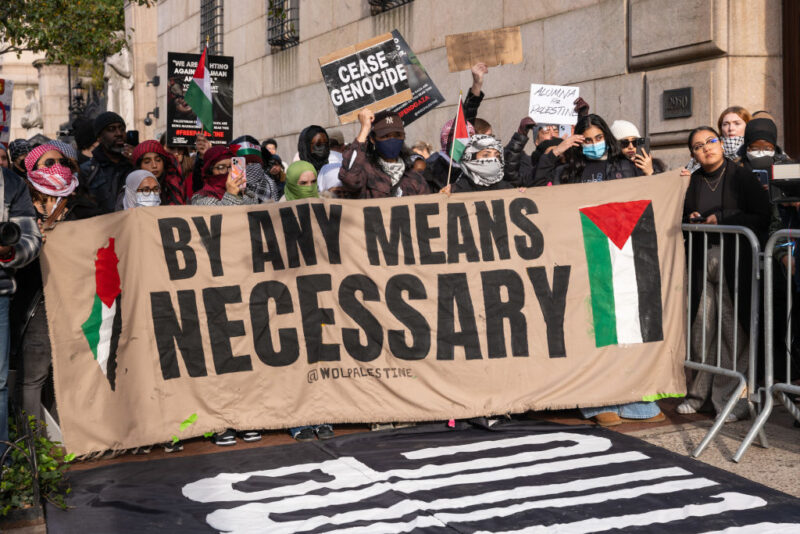SURVEY SAYS
Study: Jewish college students feel they must hide support for Israel; their non-Jewish peers agree
New study by Tufts University political scientist Eitan Hersh, College Pulse and the Jim Joseph Foundation finds that Jewish students are also getting closer to organized Jewish community


Spencer Platt/Getty Images
Students participate in a protest against Israel outside of Columbia University in New York on Nov. 15, 2023.
More than a third of Jewish college students report hiding their identity since Oct. 7, such as no longer wearing jewelry with the Star of David, in order to fit in — double the number of university students who said they did so before the Israel-Hamas war, according to new research.
The study, conducted by Tufts University political scientist Eitan Hersh in partnership with College Pulse and funded by the Jim Joseph Foundation, found that more than three-quarters of Jewish students (77%) have noticed a social stigma around supporting Israel’s right to exist. Non-Jewish students surveyed also agree that there’s a social stigma associated with supporting Israel — with the highest agreement (50%) coming from those on the far left or who identify as socialist.
For the study, Hersh surveyed students nationally pre- and post-Oct. 7. Since the earlier study, conducted in 2022, the number of students who expressed that they feel judged on campus for being openly Jewish rose dramatically, from 24% to 42%. The number of students who felt they must hide being Jewish on campus to fit in today climbed from 20% to 36%.
“The typical Jewish college student didn’t grow up with a Jewish education, doesn’t necessarily attend Hillel, maybe has one Jewish parent and one non-Jewish parent. Even in that broad population, you see a huge number of the students saying that they had to hide their Jewish identity and personally had to pay a social cost to attend a Jewish event,” Hersh told eJewishPhilanthropy. “The vast majority of them say they would feel social pressure just from taking the basic stance that Israel as a Jewish country should exist.”
The data confirms that political ideology plays a role in campus antisemitism. Students on the left are more likely to exhibit extreme negative attitudes about Israel, whereas students on the right are more likely to endorse prejudicial statements about Jews.
“What the data shows,” Hersh continued, “is that this is not about one or two isolated incidents or just a few kids… also that it’s not just in the head of some Jewish students — we actually saw a higher rate of non-Jewish students saying they don’t want to be friends with someone who supports the existence of Israel as the Jewish state.”
“The social stigma is felt by the Jewish students,” Hersh said, “and it makes sense they feel that way because the non-Jewish students are saying they endorse that social stigma.”
At the same time, the survey found that Hersh’s depiction of the “typical Jewish college student” — someone who isn’t involved with the organized Jewish community — could be changing. In the wake of Oct. 7, Jewish students polled reported feeling a heightened sense of Jewish identity. Thirty-five percent said they feel very close to a Jewish community, double the amount who did in 2022.
The findings represent a midpoint in the research, with another survey expected to be conducted in the spring and a full report slated for summer.
The 2022 survey polled approximately 2,000 Jewish students and 1,000 non-Jewish students across the U.S. who were attending four-year colleges. Soon after the Oct. 7 attacks, a second survey was fielded between Nov. 16 and Dec. 21. This survey was completed by about 1,000 Jewish students and 1,500 non-Jewish students on 21 diverse public and private campuses, all with sizable Jewish populations (the 2022 study didn’t focus on schools with substantial Jewish student bodies). The Jewish students include those who consider themselves ethnically or culturally Jewish even if not Jewish by religion. Of the Jewish students surveyed in 2023, 155 were among the students who were surveyed in 2022. In the first survey, they were freshmen and sophomores. Now, they’re juniors and seniors.
The data shows “both immense challenges and opportunities,” among college students, Stacie Cherner, director of research and learning at the Jim Joseph Foundation, said in a statement.
“Both in scale and depth, the research goes beyond anecdotal stories many of us have heard,” Cherner said. “Jewish students feel more isolated and ostracized, and they feel this from peers of all political perspectives.”











